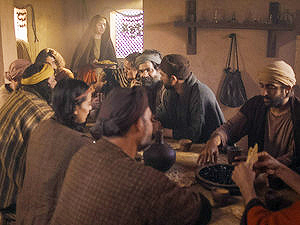Let the words of this promise settle into your heart. Jesus, who calmed the raging winds and waves of Galilee, has promised to be present with us! Jesus, who turned a little boy's fish sandwich into a feast for a multitude, has promised to show up and join us at our gatherings! Our all-powerful Savior, who stooped to wash his disciples' feet, has promised to be present at the Table sharing the bread and the wine with us! Matthew wants us to know that Jesus in his earthly ministry is Immanuel, God with us (Matthew 1:23)!
Yet, Matthew doesn't stop with this promise of Immanuel in chapter 1: three more times Matthew will emphasize Jesus as Immanuel,* God with us. The last three come as promises from Jesus himself. Today we want to look at the promise in chapter 18, where Matthew helps us hear Jesus' promise about being present in genuine spiritual family: "For where two or three gather in my name, there am I with them" (Matthew 18:20 emphasis added).
This promise of Jesus is astounding. Yet we can miss the radical delight of this promise because we've heard these words so many times before and because many of us have only experienced watered-down versions of spiritual family. Listen to this promise again; this time entering into the moment as Jesus makes this promise to the disciples he knows he will leave behind on earth to carry on his work:
- Even when there are only a few of you, two or three, this promise of Jesus' real presence is true.
- When you gather to honor me, to invite me into your presence, to trust in my power and to long for my presence, this promise is true.
- No matter where you may be when you gather in my name, this promise is true.
- And here is my promise: I will be with you... you can experience Immanuel — God truly present among you!
Jesus' promise does not mean that he abandons us when we are alone — the Lord promised to never leave us or forsake us (Hebrews 13:5-6) and Paul assured us that nothing could separate from the love of God (Romans 8:32-39). Yet Jesus is speaking to something vital and necessary for our lives to be full. We need others! Not just any others, but we need others who share our faith, our journey, and our Lord. The whole of the Bible declares it, so let these few reminders call you to it!
God announced to the hosts of heaven that it was not good for the first person to do life alone (Genesis 2:18).
Jesus sent out his disciples two by two because it was not good for his disciples to do ministry alone (Mark 6:7; Luke 10:1).
The strongest servant of God I can find was the apostle Paul. He is seldom found alone, and when he was alone he didn't do well — in Athens he didn't wait for Timothy and Silas to return and help minister and was laughed out of town and humiliated (Acts 17:14-16; Acts 17:32; 1 Corinthians 2:3-4) and in his last imprisonment he begs for Timothy to get to him as soon as he could (2 Timothy 4:11-18).
 The Lord is present in a special way when we gather in his name with other believers and the power of the Lord is present (1 Corinthians 1:2; 1 Corinthians 5:4).
The Lord is present in a special way when we gather in his name with other believers and the power of the Lord is present (1 Corinthians 1:2; 1 Corinthians 5:4).
You can call this gathering a community — that's the politically correct term these days — or you can call it by a more biblical term, like family or fellowship or the gathering together of the Lord's people.
The Lord is present when this gathered group, no matter how large or small, calls on his name and sees Jesus and his spiritual family the main reason for gathering (1 Corinthians 1:2; Matthew 18:20). When this happens, Immanuel — God is with them!
Yet for this promise of the Lord's presence to be fully experienced, this gathering of family must have the character of an authentic Jesus fellowship — the context of Jesus' promise is all about the character of genuine spiritual family. There is something about living this kind of "Jesus life" together that enables us to experience the very presence of the living Lord Jesus.
So what are these elements of genuine family, authentic fellowship, and true spiritual community? Thankfully, Matthew recorded four core elements for us in the verses surrounding Jesus' promise. To experience Immanuel in spiritual family...
- I have to be accountable for my actions and my influence (Matthew 18:6-9). The issue Jesus is talking about here is my influence on others toward sin. I am responsible for the influence of my sin or the abuse my freedom in Christ that could cause a new believer to sin. Living in community means I take seriously the impact of what I do on those around me!
- I have to reach out and rescue those in trouble (Matthew 18:10-14). Like a shepherd that goes in search of his lost sheep, I must be willing to go out and find those who are part of my family or flock that I know are in trouble (James 5:19-20). In Jesus' fellowship, I am my brother's (or sister's) keeper!
- I have to hold those who sin accountable and work to redeem them (Matthew 18:15-20). Rather than gossip about them or condemn them in some other way, I am responsible to go, to help my friend see the error of his or her way, and bring that friend safely home.
- I must forgive those who sin against me, and I must do so generously from the heart (Matthew 18:21-35). Jesus has forgiven me with sacrificial generosity and great love; I must do the same with others who have wronged me.
 Over the years, I've often wondered why we have neglected to teach about the very real presence of the living Lord among us when we gather in his name as his spiritual family. My spiritual hunch is that there are two primary reasons.
Over the years, I've often wondered why we have neglected to teach about the very real presence of the living Lord among us when we gather in his name as his spiritual family. My spiritual hunch is that there are two primary reasons.
First, this kind of spiritual community, this kind of genuine family, and this kind of authentic fellowship is hard and also politically incorrect. While most people yearn for close community, most don't want it to come with this kind of scrutiny and responsibility. Many today push others away and don't want anyone sticking his or her nose into their "personal" business. It is easier to avoid them — or flame or shame them on Facebook — than it is to live in this kind of costly, honest, forgiving, redeeming, and open fellowship.
Second, the images that Jesus uses here are off-putting to a society where everything goes and we are to be hesitant to have any standards to our relationships or friendships except the acceptance of everything. Look at the strong language of Jesus here:
- Putting a donkey-sized millstone around our neck and being thrown into the sea (Matthew 18:6).
- Gouging out our eyes or cutting off our hands if they lead us to sin (Matthew 18:7-9)
- Being thrown into the fires of Gehenna (Matthew 18:8-9).
- Being handed over to the officer of torture in a prison (Matthew 18:34)
Jesus is using a common rhetorical device called hyperbole. But don't read that as meaning exaggeration: Jesus is using shocking language to communicate the urgency and importance of the message he is sharing. He wants to shock us into listening because of what is stake:
- Our desperate need to experience Immanuel, God with us and to know that God is real and truly among us.
- Our desperate need for this kind of fellowship and spiritual family to be true and not just talk.
- The desperate need of those outside of Jesus to find a place where they can be real, loved, forgiven, accepted, yet challenged to be what Jesus has called them to be.
 So let's not water down Jesus promise that "where two or three gather in my name, there am I with them" (Matthew 18:20). Jesus isn't talking about "going to church"! The Lord is inviting us into a wild and reckless family of loving commitment to each other — a spiritual fellowship that risks to lovingly confront, radically forgive, and responsibly recognize our vital connection to each other.
So let's not water down Jesus promise that "where two or three gather in my name, there am I with them" (Matthew 18:20). Jesus isn't talking about "going to church"! The Lord is inviting us into a wild and reckless family of loving commitment to each other — a spiritual fellowship that risks to lovingly confront, radically forgive, and responsibly recognize our vital connection to each other.
Years ago, I heard a story attributed to the ancient rabbis. There were two brothers who loved each other very much. They each farmed half the land left to them by their father. One of the brothers married and had a family. The other brother remained single. As each looked at how the Lord had greatly blessed him, he knew he had to share his blessings with his brother.
So late one night each week, the married brother would sneak out in the middle of the night and take a sack of grain and put it into his brother's barn. "The LORD has blessed me greatly," the brother thought to himself. "I have been blessed with fertile land, good crops, and a great harvest. I have a family and blessed with so many things. Surely I must share these blessings with my brother who does not have a family." So he would set out and put the sack of grain into his brother's barn.
And late one night each week, the unmarried brother would sneak out in the middle of the night and take a sack of grain and put it into his brother's barn. "The LORD has blessed me greatly," the brother thought to himself. "I have been blessed with fertile land, good crops, and a great harvest. I have all of these great blessings and no family to support. Surely I must share these blessings with my brother who has this family responsibility." So he would set out and put the sack of grain into his brother's barn.
As God would have it, one night on their way to the other's barn, the brothers met, each with a sack of grain. In their collision, they first experienced laughter and delight realizing the great love they had for each other. Then they embraced with tears of great joy and appreciation. Where their tears of joy fell and blessed the good earth, the LORD God decided that this was where the Temple must be built; for the LORD dwells at the place where loving laughter and delight fill his people with joy and appreciation.
Jesus' promise takes the truth of the rabbis' story one step beyond: Immanuel's presence, the dwelling of God, is not a place, but a people — a people who live in authentic fellowship, in genuine family, and real spiritual community. These are the people among whom God lives and in whom God dwells!
Do you want to really experience Immanuel?
Do you want Jesus' presence to be real for you and those you love?
Jesus promises us that Immanuel can be and will be found when we come together as family who live in genuine fellowship. Let's not settle for anything less than the living Lord among us!
Comments, Reactions, and Questions from the Partners:
 Tim Woodroof Do you want to really experience Immanuel? |
We can all agree this kind of community would be a good thing, don't you think, Phil? And many of us are willing to critique our present experience of community, to lament how far short of intimacy it falls. What's difficult is actually practicing this new community. Not talking about it or wishing it were so or waiting for the elders to implement a new church policy... but being the kind of person that invites and creates this kind of community. You and I can start being accountable now — by asking someone we respect to hear our confessions and call us to higher living. We can rescue the troubled — by becoming aware of those who need help and having the courage to offer it. We can hold others to their commitments — by being radically honest and daring to expect the best of those we love. We can forgive and move on. Nothing is stopping us from practicing the disciplines of a more intimate community. We don't need a pulpit announcement or everyone in the church to agree with us on these matters. We just need to be people who are this vulnerable and this committed... and trust that enough of our brothers and sisters will find this attractive and respond in kind to form the kind of community where the presence of God is experienced. |
 Response |
Thanks Tim. I still remember years ago when a group of young ministers began to get together each year. We were going to help each other become better ministers and be there for each other — whatever all that meant. The start of the second year, one of the 22 guys got a lot more real than any of us dared the first year — he confessed that he had a problem, was headed into rehab as soon as our meeting was over, and probably would lose his job. At that moment, losing his job was the least of his concerns. We prayed. Then our group became a yearly support group that helped each other through death threats, firings, cancer, death of a spouse, heartbreak with kids, and personal struggles with self and sin. I cannot imagine where any of us would have been without our honesty and the loving support of brothers who shared our journey. As church leaders, we can talk a good game, but before "our people" do these things, they have to see us live them or they will be reluctant to respond. Your words, however, are great for leader and member alike. The only thing that keeps us from beginning a small spiritual family that practices these elements of life in relationship with Jesus is really simple — our unwillingness to invest in doing what Jesus calls us to do to bring his presence to life in our midst. |
 Mark Frost |
Thank you, Phil, for reminding us of the costly commitment to shared life that makes Jesus' presence among us possible. Your thoughts are the equally-true flip side to John's admonition, "Anyone who does not love his brother, whom he has seen, cannot love God, whom he has not seen" (1 John 4:20). Your point is that anyone who does not love his brother, whom he has seen, cannot experience the presence of Immanuel, whom he has not seen. Because Jesus is unseen, it is easy for us to idealize the kind of life we would have if we were with him. Surely, loving the sinless Son of God would be a breeze compared to trying to get along with the selfish, insensitive, manipulative jerks that inhabit our world! We forget that living with Jesus — his perfection notwithstanding — was no walk in the park for his disciples. It was challenging, humbling, confusing, frustrating work. His call for us to love each other as He did casts "seeking His presence" quite counterintuitively. Rather than seeking him only through solitude, quietness, and meditation, we seek him by fully engaging in and embracing the messy process of investing our lives in each other. As we commit ourselves to them, we find that we have come to know Him. |
 Response |
Yes, Mark, it is easy to idealize Jesus and make him into a low demand friend who is always there when we need him. Jesus IS always there, but he IS NOT low demand. The messy thing about Jesus being Lord is that he calls us into relationships just like the ones he had — complex, confusing, difficult, bewildering, frustrating... on one hand, while being tender, loving, sacrificial, expressive, and helpful on the other. Yet I think it is in the rub of the grit in these relationships that Jesus shows up. We are reminded that Jesus lived in the places we find ourselves with others, and then we realize that he is really here with us in this moment of messy relationship with someone else. We experience the touch of the Savior when someone reaches out to comfort us. We hear the comforting voice of the Master as someone else speaks encouragement into our lives. We feel the presence of the Shepherd as we go in search of someone who has wandered and is actually glad someone loved them enough to come look for them. |
 Greg Anderson |
Phil — the times I have experienced authentic fellowship, genuine family, and real spiritual community have been some of the sweetest seasons of my life. It is important that we are not deceived. These seasons are not exclusively reserved for corporate worship. Ironically, most of our broken fellowship seems to revolve around what happens in that one hour or so context. Quite frankly, the Deceiver has done a great job convincing us that this is acceptable and — even though twisted — that this is pleasing to God. When we go to battle together in the trenches during the ebb and flow of everyday living, we find corporate worship so much more of a blessing because we don't just see the promises of Christ in his word, life, and example — we see them in those with whom we journey through life with as Christ is as at work within them. So grateful to be on the journey together! |
 Response |
Greg, I appreciate you using the words deceived and the Deceiver. Deception often controls the day when "big box worship" completely replaces intimate and confessional fellowship and family language "at church" replaces family intimacy in our spiritual communities. I believe we need both — celebration experiences and intimate fellowship as spiritual family. We do seem pretty lopsided, however, in the investment of our time, energy, talent, and focus on what happens in the "big box." Such is the nature of the Deceiver's method: so many journey the walk of faith and feel so alone. |
** Here are the four Immanuel sayings in Matthew and their focus.
- Matthew 1:23 — Know the real Jesus through His Story.
- Matthew 18:20 — Live as Genuine Spiritual Family.
- Matthew 25:40 — Invest in Others through Acts of Compassion.
- Matthew 28:20 — Reach and Mentor others to live like Jesus.
[Return to Place in Article]
 "I Need More Than Me!" by Phil Ware is licensed under a Creative Commons License. Heartlight encourages you to share this material with others in church bulletins, personal emails, and other non-commercial uses. Please see our Usage Guidelines for more information.
"I Need More Than Me!" by Phil Ware is licensed under a Creative Commons License. Heartlight encourages you to share this material with others in church bulletins, personal emails, and other non-commercial uses. Please see our Usage Guidelines for more information.









Reader Comments
Archived Facebook Comments